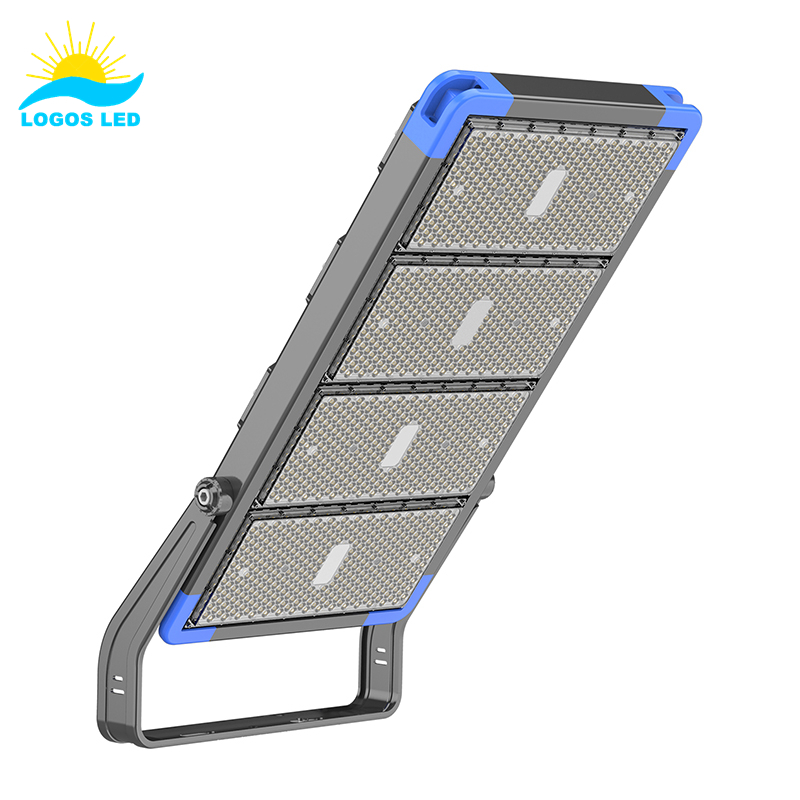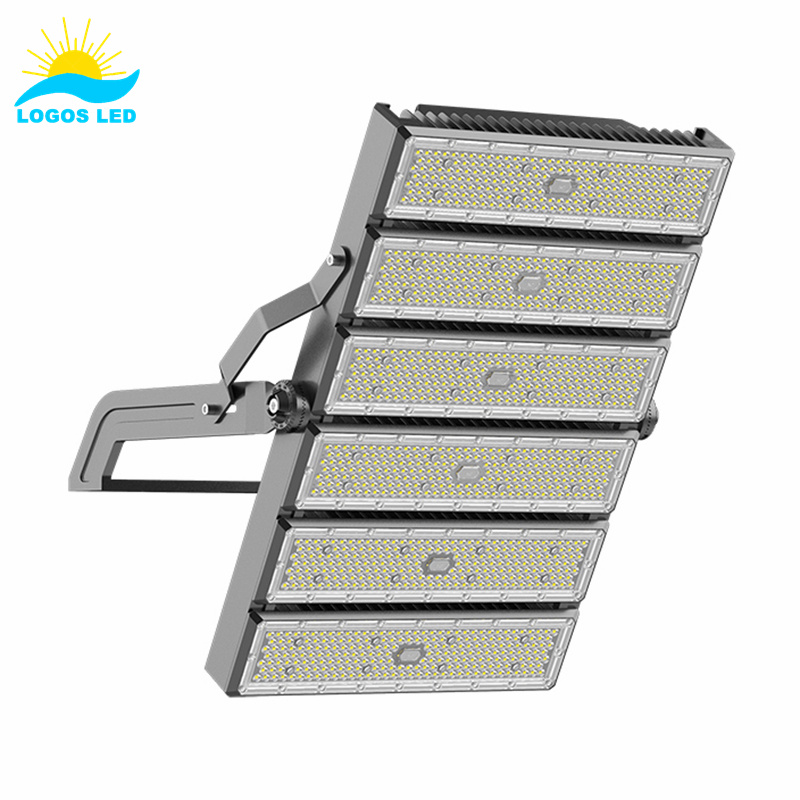
Introduction
The evolution of stadium spotlights marks a fascinating journey through history, mirroring advancements in technology and our deepening understanding of how light affects both play and perception in sports. From the rudimentary use of floodlights to illuminate early 20th-century baseball fields to the sophisticated, high-intensity lighting systems of today, the quest for the perfect illumination of sports venues has been relentless. This journey has been propelled by the desire to extend playing hours, enhance safety, and improve the viewing experience for fans worldwide.
In this context, the advent of LED (Light Emitting Diode) stadium spotlights represents a significant milestone, transforming night games into spectacular events that captivate audiences and offer unparalleled visibility for athletes. Unlike their predecessors, LED spotlights deliver superior brightness, energy efficiency, and longevity, marking a shift not just in technology but in how we experience sports after dark. This transformation is not merely about the practicalities of illumination; it’s about elevating the game itself, making every pass, goal, and touchdown shine under the brilliant glow of LED lights.
As we delve into the world of LED stadium spotlights, we uncover the multifaceted benefits of this lighting revolution. From slashing energy costs to offering a dynamic tool for enhancing the ambiance of night games, LED spotlights have become a game-changer in sports lighting. Their introduction has not only made night games more visually stunning but has also set a new standard for how sports events are presented and enjoyed. Let’s explore how LED stadium spotlights are lighting the way to the future of sports, transforming night games into illuminated spectacles that entertain and excite like never before.
The Advancement of Stadium Lighting
The story of stadium lighting is a narrative of innovation, evolving from the basic incandescent bulbs of the early 20th century to the sophisticated LED systems that illuminate today’s sports arenas. This journey mirrors the broader trajectory of technological progress, reflecting how advances in lighting technology have transformed the spectacle of night sports.
Historical Context: From Traditional Lighting to Modern LED Solutions
The initial foray into stadium lighting was driven by a simple yet revolutionary idea: to extend the hours during which sports could be played and watched. The first major experiment in this endeavor took place in 1935 at a baseball game in Cincinnati, employing large, incandescent bulbs. While effective, these early systems were energy-intensive, offered limited lifespan, and produced a great deal of heat. The subsequent introduction of metal halide and high-pressure sodium lamps marked improvements in efficiency and longevity but still fell short of ideal, with issues like long warm-up times and color distortion.
The breakthrough came with the advent of Light Emitting Diode (LED) technology. Initially used in smaller applications due to their high cost and limited output, LEDs underwent rapid advancements over the years. Innovations in semiconductor materials and chip design led to significant improvements in brightness, energy efficiency, and color accuracy, catapulting LEDs into the forefront of stadium lighting solutions.
Key Technological Advancements in LED Spotlights
The leap to LED stadium spotlights brought with it several key technological advancements:
- Energy Efficiency: LEDs consume significantly less electricity than traditional lighting systems, slashing energy costs for stadiums and reducing their carbon footprint.
- Longevity and Durability: LED lights boast a much longer lifespan, often lasting tens of thousands of hours with minimal luminance degradation. Their solid-state construction also makes them more resistant to shock and vibration, ideal for outdoor and high-activity environments.
- Instant On/Off and Dimming Capabilities: Unlike metal halide lamps, LEDs reach full brightness instantly and can be turned off without a cooldown period. They also offer full dimming capabilities, allowing for dynamic lighting effects and energy savings.
- Improved Spectator Experience: LED lighting provides a quality of light that closely mimics natural daylight, enhancing visibility for players and the viewing experience for fans. The ability to precisely control light spill and glare further improves conditions for both athletes and spectators.
- Environmental Sustainability: Beyond energy savings, LED lights reduce the need for frequent replacements, lowering the demand for manufacturing, packaging, and transportation, and they contain no harmful substances like mercury, making them more environmentally friendly.
The advancement of stadium lighting from traditional to LED solutions represents a significant leap forward in sports technology. LED stadium spotlights not only enhance the visual presentation of games but also align with broader goals of sustainability and efficiency. As we continue to push the boundaries of what’s possible in stadium illumination, LED technology stands at the forefront, lighting the path toward a brighter, greener future in sports entertainment.
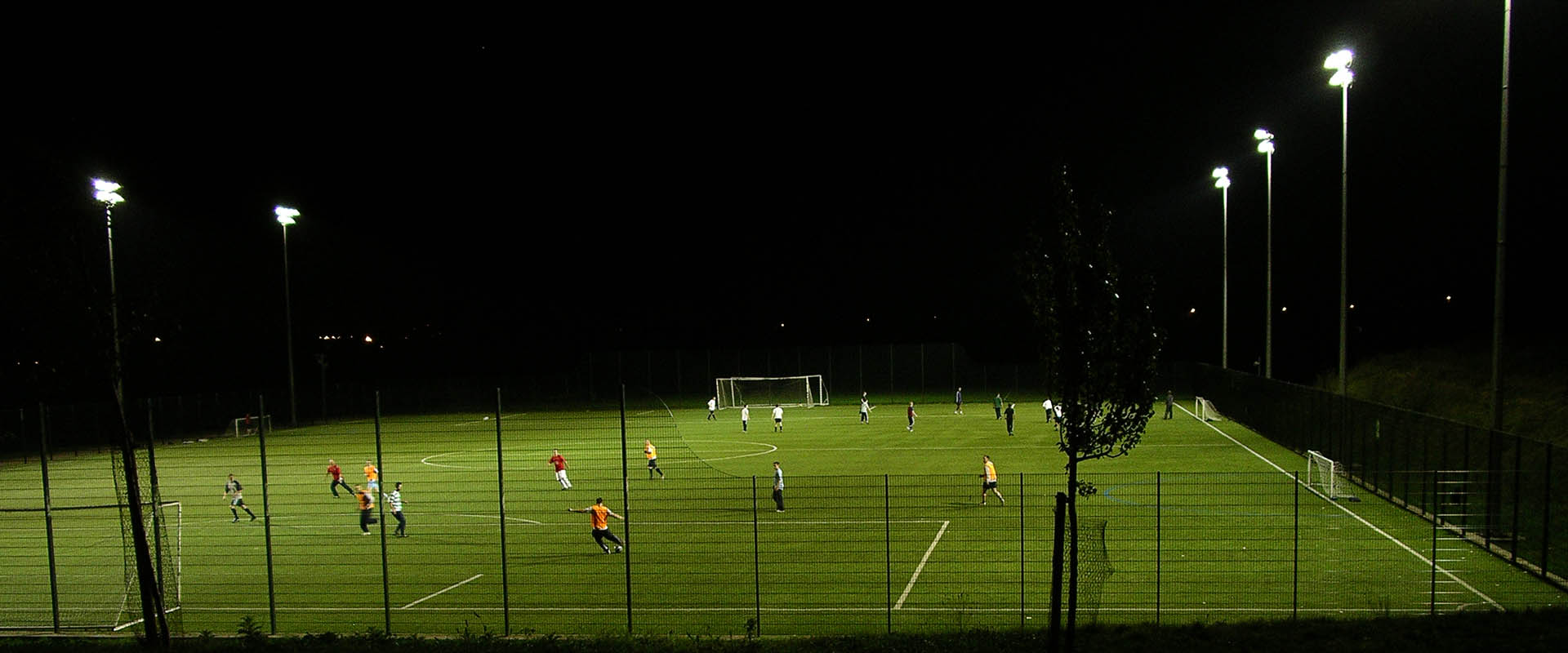
Benefits of LED Stadium Spotlights
The transition to LED stadium spotlights is not just a technological upgrade; it’s a strategic investment in the future of sports entertainment. These cutting-edge lighting solutions bring a plethora of benefits that far surpass those offered by traditional lighting systems. Let’s delve into the key advantages that LED lights provide to stadiums around the globe.
Energy Efficiency
- Comparison of Energy Consumption: LED lights consume significantly less power than traditional lighting solutions like metal halide or high-pressure sodium lamps. On average, LED lighting can reduce energy consumption by up to 50-70%, with some installations reporting even higher savings.
- Long-term Cost Savings: The initial investment in LED lighting is quickly offset by the substantial reductions in energy bills. Over time, the savings accumulate, making LED a financially smart choice for stadiums.
- Environmental Impact: Lower energy consumption translates directly into a reduced carbon footprint, making LED lights a greener alternative. This shift supports global efforts to combat climate change by decreasing the overall demand for fossil fuels.
Enhanced Visibility and Safety
- Improving Visibility: LED stadium spotlights produce a bright, uniform light that closely mimics natural daylight. This enhances visibility for players, allowing for better game performance and reducing the risk of injuries due to poor lighting.
- Enhancing Safety: For spectators, well-lit stadiums improve navigational safety, reducing the chances of accidents in the stands and around the venue. Additionally, the improved visibility extends to parking lots and surrounding areas, enhancing overall safety during night games.
Durability and Longevity
- Lifespan Comparison: LED lights boast an impressive lifespan, often exceeding 50,000 to 100,000 hours, significantly outlasting traditional light sources. This longevity reduces the frequency of bulb replacements.
- Reduced Maintenance Needs: The durability of LED lights also means less maintenance and lower operational costs over time. Their solid-state design makes them resistant to shocks, vibrations, and external impacts, further extending their service life.
Flexibility and Control
- Customizable Lighting Schemes: LED technology allows for precise control over lighting levels and colors, enabling stadiums to create customizable lighting schemes. This flexibility can be used to enhance the atmosphere of events, coordinate with team colors, or celebrate specific occasions.
- Instant On/Off and Dimming Capabilities: Unlike traditional lighting, which requires time to warm up or cool down, LED lights respond instantly to control inputs. This feature enables dynamic lighting effects and contributes to energy savings by allowing lights to be dimmed or turned off when full brightness is not needed.
The adoption of LED stadium spotlights represents a significant advancement in how sports venues are illuminated. From energy savings and environmental benefits to improved visibility, safety, and operational efficiency, LED lights are reshaping the landscape of nighttime sports, making every event a spectacular showcase of athleticism and entertainment.
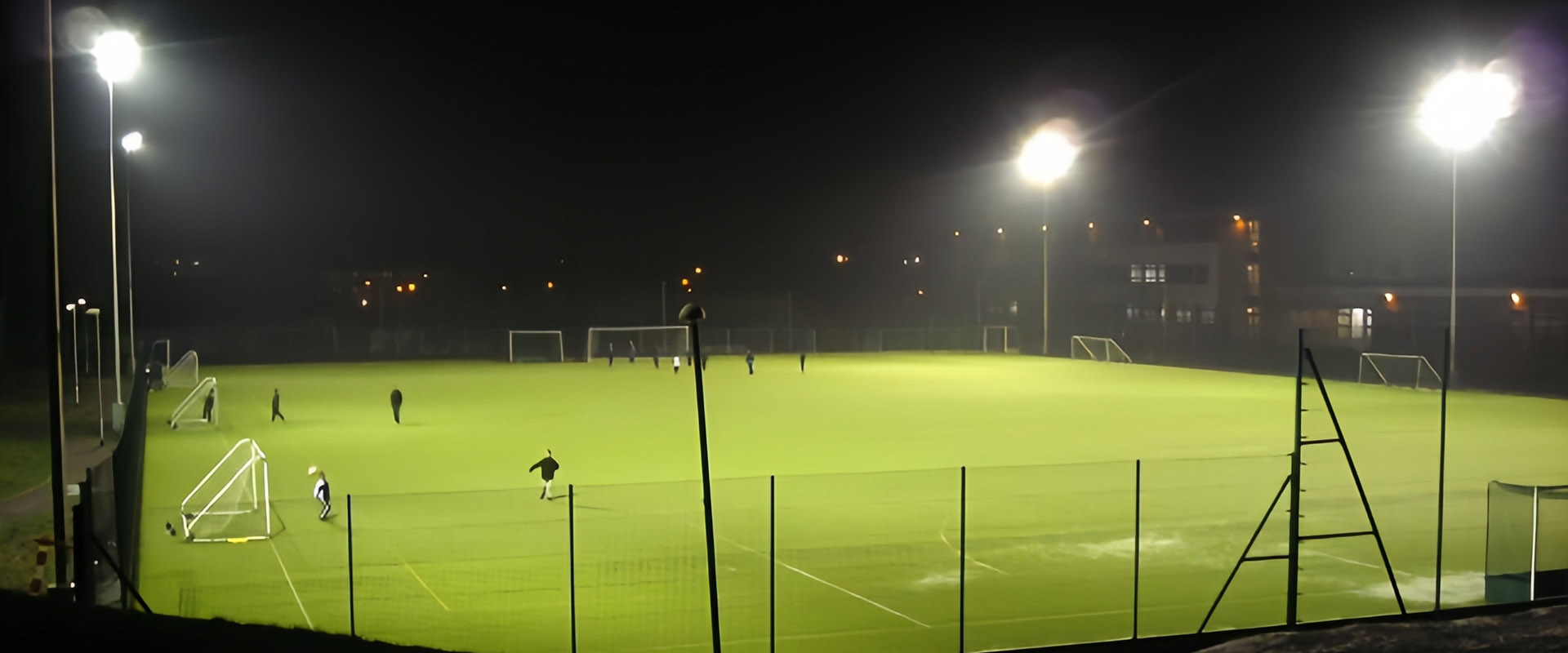
The Impact of LED Stadium Spotlights on Night Games
The advent of LED stadium spotlights has not only revolutionized the way stadiums are illuminated but has also significantly impacted the experience of night games for both spectators and athletes. Through a combination of enhanced visibility, energy efficiency, and dynamic control, LED lighting is transforming night games into unforgettable spectacles.
Impact on Spectator Enjoyment and Engagement:
- The crisp, bright light of LEDs improves visibility, making it easier for fans to follow the game and catch every detail of the action. This clarity keeps spectators engaged and enhances their overall enjoyment of the event.
- The ability to instantly adjust lighting allows for pre-game and halftime shows to incorporate visually stunning light displays, further elevating the fan experience and making night games not just competitions but complete entertainment spectacles.
Enhanced Visibility for Players:
- LED stadium spotlights provide a level of illumination that closely mimics natural daylight, significantly improving visibility on the playing field. This allows athletes to better see the ball, their teammates, and opponents, leading to improved reaction times and overall performance.
Reduced Glare and Shadows:
- Properly designed LED lighting systems minimize glare and eliminate harsh shadows that can interfere with an athlete’s vision and concentration during critical moments of play. This not only helps in reducing errors but also contributes to the safety of the players, reducing the risk of injury.
Consistency Across the Field:
- The uniformity of light distribution achieved by LED spotlights ensures that all areas of the playing surface are evenly lit. This consistency eliminates the problem of underlit spots or overly bright areas, providing a fair playing environment where athletes can perform at their best.
The impact of LED stadium spotlights on night games extends far beyond the technical benefits of improved lighting. By transforming the viewer experience and enhancing athletic performance, LED lighting is setting a new standard for night sports. Stadiums equipped with LED spotlights offer a more vibrant, engaging, and safe environment for everyone involved, from the players on the field to the fans in the stands, making every night game an event to remember.
Challenges and Considerations
While the switch to LED stadium spotlights brings numerous benefits, transitioning from traditional lighting systems involves several challenges and considerations. Proper planning and strategic decision-making are crucial to navigate these hurdles effectively and to ensure that the investment in LED lighting maximizes its potential benefits.
Initial Installation Costs and Planning for the Transition
- Financial Investment: The upfront cost of purchasing and installing LED lighting systems can be significant. High-quality LED stadium spotlights, along with the necessary infrastructure modifications, represent a substantial financial commitment.
- Comprehensive Planning: Transitioning to LED lighting requires meticulous planning to minimize disruptions, especially in stadiums that host frequent events. This includes conducting detailed audits of existing lighting, infrastructure assessments, and scheduling installations to avoid conflicting with scheduled games or events.
- ROI and Long-Term Savings: While initial costs are higher, the return on investment (ROI) through energy savings, reduced maintenance costs, and longer lifespans often justifies the expenditure. Stadium operators need to consider these long-term financial benefits in their planning.
Selecting the Right LED Lighting Solutions for Different Stadium Sizes and Types
- Customization to Venue Needs: Stadiums vary greatly in size, layout, and usage, necessitating tailored lighting solutions. LED spotlights must be selected based on specific requirements, such as the level of illumination needed, color rendering capabilities, and beam spread.
- Technical Specifications: Understanding the technical specifications of LED lights, including luminous efficacy, color temperature, and IP rating for outdoor durability, is essential. This ensures that the lighting not only meets the visual demands of broadcasting and live viewing but also withstands the environmental conditions specific to the stadium’s location.
- Expert Consultation: Consulting with lighting professionals who specialize in sports facilities can provide valuable insights into the most effective LED lighting strategies. Their expertise can help stadium operators choose the right products and design an optimal lighting setup that enhances both athlete performance and spectator experience.
The transition to LED stadium spotlights, while advantageous, requires careful consideration of initial costs, long-term financial planning, and the selection of appropriate lighting solutions tailored to the unique characteristics of each venue. By addressing these challenges with thorough planning and expert advice, stadium operators can ensure a smooth and successful upgrade to LED lighting, setting the stage for enhanced night games that players and fans will enjoy for years to come.
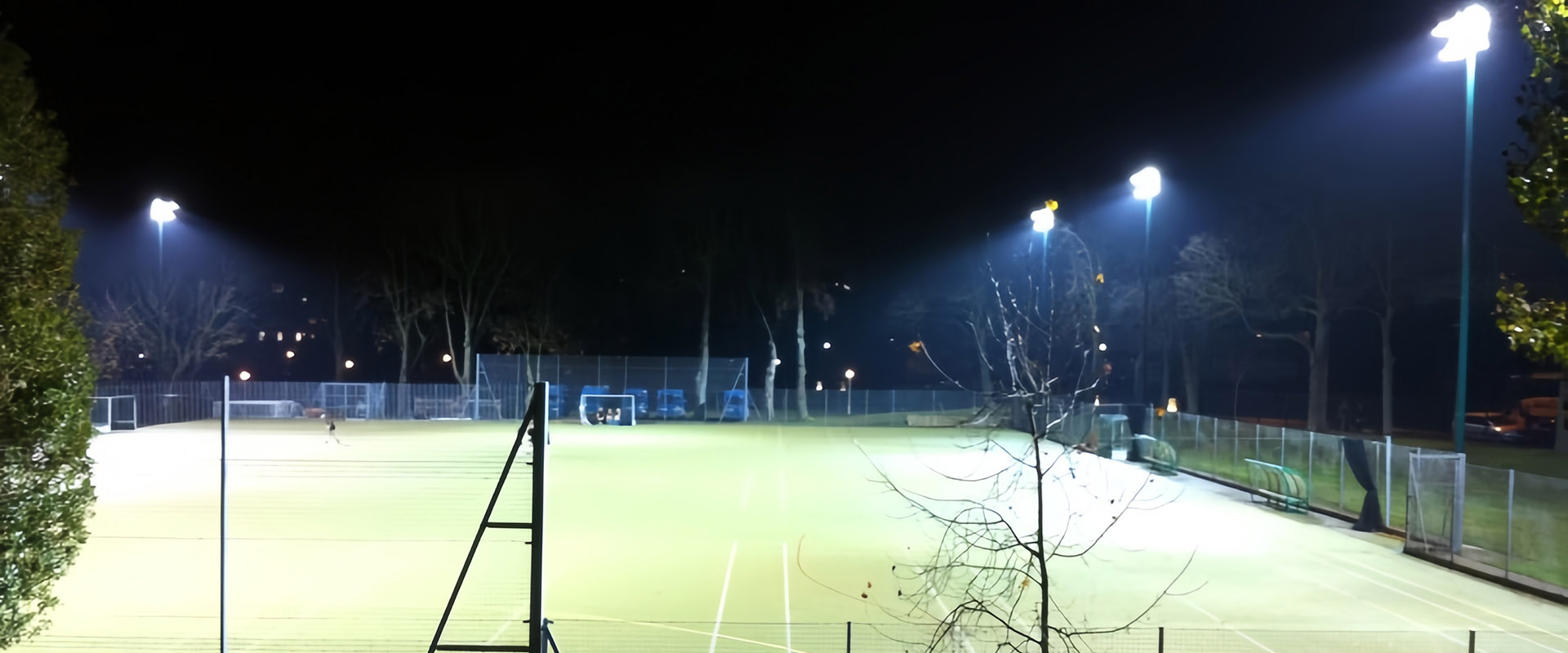
Future of Stadium Lighting
The evolution of stadium lighting is entering an exciting new phase, with LED technology at the heart of forthcoming innovations. As advancements continue to emerge, the future of stadium lighting promises not only enhanced visual experiences but also smarter, more interactive, and energy-efficient systems. Here’s a glimpse into what the future holds for stadium lighting.
Innovations on the Horizon for LED Stadium Spotlighting Technology
- Higher Efficiency LEDs: Researchers are continuously working on LEDs that offer even greater luminous efficacy. Future LED lights are expected to consume even less energy while providing brighter illumination, pushing the boundaries of efficiency and sustainability.
- Advanced Color Tuning: Upcoming LED technologies may allow for real-time adjustments to the color temperature and spectrum of stadium lights. This capability could be used to create lighting conditions optimized for specific events or times of day, improving the accuracy of color rendering and enhancing the overall viewing experience.
- Dynamic Beam Shaping: Innovations in optics and control mechanisms will enable LED stadium lights to dynamically change their beam patterns. This will allow for precise lighting of specific areas of the field or court as needed, improving visibility and flexibility in lighting design.
Potential for Integration with Smart Technology and IoT for Adaptive Lighting Systems
- Smart Controls: The integration of LED stadium lights with smart technology and the Internet of Things (IoT) will enable lighting systems to become more adaptive and responsive. Sensors could detect changes in environmental conditions, crowd density, or even the pace of the game, automatically adjusting lighting levels and patterns in real time.
- Energy Management: IoT-connected LED systems will facilitate more sophisticated energy management strategies. By monitoring real-time energy consumption and automating lighting adjustments, stadiums can significantly reduce their operational costs and carbon footprint.
- Enhanced Fan Engagement: Future lighting systems could interact with mobile apps or wearables, allowing fans to engage with the lighting during events. Imagine interactive light shows or the ability to vote for lighting colors or effects, creating a more immersive experience for attendees.
- Predictive Maintenance: With smart technology, LED lighting systems can predict when maintenance is needed, reducing downtime and ensuring consistent lighting performance. This proactive approach will streamline operations and maintenance tasks.
The future of stadium lighting is bright, with LED technology leading the way towards more sustainable, adaptable, and engaging lighting solutions. As innovations continue to unfold, stadiums around the world will not only become showcases for sporting excellence but also for cutting-edge technology that enhances the experience for all. The integration of LED lights with smart technology and IoT promises a future where stadium lighting is not just functional but a dynamic part of the event itself, contributing to the excitement and enjoyment of every game.
Conclusion
The journey through the capabilities and innovations of LED stadium spotlights has illuminated the vast potential these lighting solutions hold for transforming sports events. From the fundamental enhancements in energy efficiency and visibility to the advanced possibilities offered by smart technology integration, LED lighting stands as a cornerstone in the evolution of stadium experiences.
The Future Role of LED Lighting in Sports Events
As we look to the future, it’s clear that LED stadium spotlights will play a pivotal role in shaping the way sports events are experienced. The ongoing advancements in LED technology promise even greater efficiency and capabilities, ensuring that stadiums can adapt to the evolving demands of modern audiences. The integration of smart technology and IoT will open up new avenues for engagement, energy management, and immersive experiences, making LED lighting a key player in the digital transformation of sports venues.
In conclusion, the shift towards LED stadium spotlights is not merely a trend but a significant leap forward in sports event management and presentation. As we embrace the innovations and possibilities offered by LED technology, the future of sports events looks brighter than ever. Stadiums equipped with LED lighting are set to offer more than just a venue for sporting excellence; they will become dynamic environments that enhance every aspect of the game, from play to fan engagement, heralding a new era in the world of sports.
Don’t let your venue be left in the shadows. Upgrade to LED stadium spotlights today and shine a light on the future of sports entertainment. Illuminate your stadium with the power of LED and watch as it transforms into a beacon of excellence, captivating athletes and spectators alike. Contact us now to begin your journey toward a brighter, more sustainable sports venue.
Featured LED Stadium Spotlights
FAQs About Stadium Lights
Get an Instant Quote Now
Let us help you get started with our superior LED lighting products.
Our LED Lighting experts can help to solve your issues.
Before sending your message, please note:
Your message goes to Logos Lighting and it may take time to reply to you.
Please complete all fields unless otherwise indicated. This will help us deal with your inquiry more efficiently. Alternatively, you can contact us directly via email: info@logosled.com.

